As a recruiter or hiring manager, you understand the impact a Business Operations Manager can have on driving efficiency and strategic alignment within an organization. The challenge lies in identifying a candidate who not only possesses the technical know-how and leadership abilities but also fits seamlessly into the company culture. It's a common misstep to overlook these nuances, focusing solely on resume keywords without considering organizational compatibility.
In this article, we guide you through the process of hiring a Business Operations Manager, from understanding their role and responsibilities to leveraging skill assessments and structuring interviews. We also highlight key platforms for sourcing candidates and the distinct differences between a Business Operations Manager and an Operations Project Manager. For further insights, explore our related resources on skill assessments.
Table of contents
Why hire a Business Operations Manager?
Hiring a Business Operations Manager can help address key challenges in your organization. For example, if you're struggling with inefficient processes or poor interdepartmental communication, a Business Operations Manager can streamline workflows and improve collaboration.
Consider hiring for this role when:
- Your company is experiencing rapid growth and needs better operational structure
- You're looking to implement new technologies or systems across the business
- There's a need to optimize resource allocation and improve overall productivity
If you're unsure about committing to a full-time hire, start by identifying specific operational issues that need attention. You can then decide whether to bring in a consultant for short-term projects or hire a permanent Business Operations Manager to drive long-term improvements.
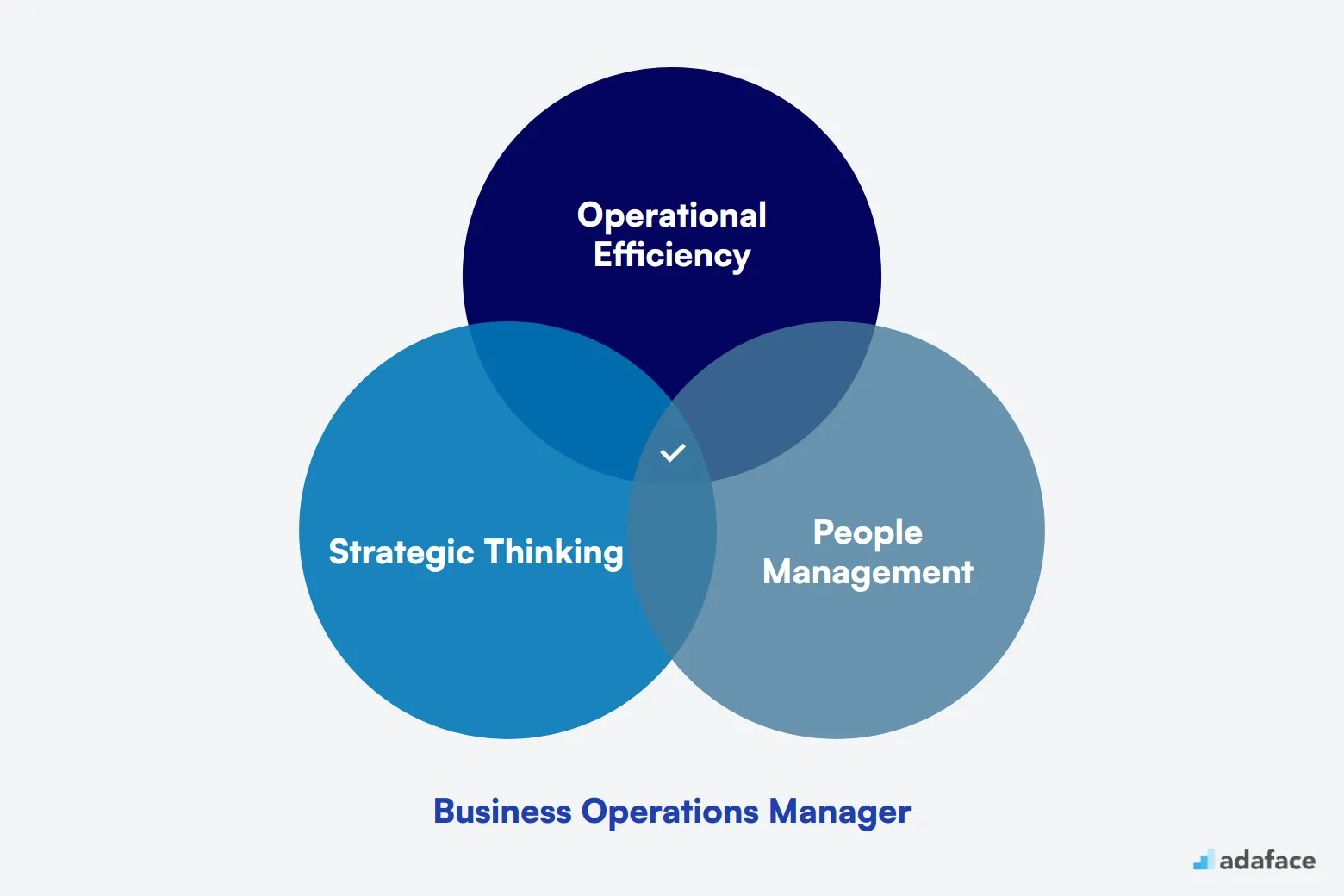
What does a Business Operations Manager do?
A Business Operations Manager plays a key role in ensuring that an organization runs smoothly. They are responsible for overseeing various aspects of operations to maximize efficiency and achieve strategic goals.
Day-to-day tasks of a Business Operations Manager include:
- Developing and implementing operational policies that align with the company's goals.
- Managing budgets and optimizing resource allocation.
- Analyzing operational processes for improvements.
- Coordinating with different departments to facilitate seamless operations.
- Leading and mentoring a team to achieve performance targets.
For a deeper look into required skills for a Business Operations Manager, dive into our detailed guide.
Key Skills and Qualifications for a Business Operations Manager
Hiring a Business Operations Manager can be complex, as the ideal candidate profile may vary significantly across organizations. It's important to differentiate between the skills that are absolutely necessary and those that would be advantageous. Misjudging this can lead to prolonged hiring processes or unsuitable hires.
To help you focus your search, consider these must-have and preferred qualifications:
Required Skills and Qualifications:
- Bachelor's degree in Business Administration or related field
- 5+ years of experience in business operations or similar role
- Proven track record of implementing process improvements
- Strong analytical and problem-solving skills
- Excellent communication and leadership abilities
Preferred Skills and Qualifications:
- MBA or advanced degree in relevant field
- Experience with ERP systems and data analytics tools
- Knowledge of lean management principles
- Project management certification (e.g., PMP, PRINCE2)
- Experience in the company's industry sector.
| Required skills and qualifications | Preferred skills and qualifications |
|---|---|
| Bachelor's degree in Business Administration or related field | MBA or advanced degree in relevant field |
| 5+ years of experience in business operations or similar role | Experience with ERP systems and data analytics tools |
| Proven track record of implementing process improvements | Knowledge of lean management principles |
| Strong analytical and problem-solving skills | Project management certification (e.g., PMP, PRINCE2) |
| Excellent communication and leadership abilities | Experience in the company's industry sector |
How to write a Business Operations Manager job description?
Once you have a clear candidate profile, the next step is to capture that information in the job description to attract the right talent. A well-crafted job description will serve as a magnet for qualified candidates, making your hiring process smoother.
- Highlight key responsibilities and impact: Clearly outline the primary responsibilities of the Business Operations Manager, such as streamlining processes and enhancing operational efficiency. Emphasising how their work directly contributes to the success of the organisation will attract candidates looking for impactful roles.
- Balance technical skills with soft skills: While it’s important to list technical qualifications like proficiency in data analysis tools and project management methodologies, don’t forget to include essential soft skills, such as leadership, communication, and problem-solving abilities. Candidates with a blend of both will be better equipped to thrive in this role.
- Showcase unique company and role attributes: Provide insights into what makes your company a great place to work, including culture, values, and growth opportunities. Highlighting the unique aspects of the role can entice top talent who are not just looking for any job but a position that aligns with their career aspirations. For example, you might include details about working on innovative projects or collaborating across teams. For a detailed job description template, you can refer to the Business Operations Manager job description.
10 Platforms to Hire Business Operations Managers
Now that you have crafted a comprehensive job description for a Business Operations Manager, it's time to list the position on relevant job platforms to engage potential candidates. Utilizing job listing sites can help you reach a larger pool of qualified applicants, making the hiring process smoother and more effective.
LinkedIn Jobs
Ideal for posting full-time Business Operations Manager positions. Offers extensive networking capabilities and reaches a wide pool of professional candidates.

Indeed
Great for listing full-time roles. Provides a large candidate base and offers easy application processes for job seekers.

Glassdoor for Employers
Useful for full-time positions. Allows employers to showcase company culture and benefits, attracting candidates who value transparency.

In addition to our first three picks, other excellent platforms include Monster for its vast resume database and candidate screening tools, and Upwork, which offers global freelance talent for flexible project-based roles. FlexJobs caters to remote seekers, while Dice targets tech-focused roles. Toptal Business provides access to top-tier candidates, ensuring high-quality hires, whereas ZipRecruiter leverages AI for precision matching. Lastly, CrunchBoard is ideal for startups seeking dynamic managers. For more insights on optimizing your hiring process, explore our hiring process blog.
Keywords to Look for in Business Operations Manager Resumes
Resume screening is a time-saving first step in the hiring process. It helps you quickly identify candidates who match your basic requirements for a Business Operations Manager role.
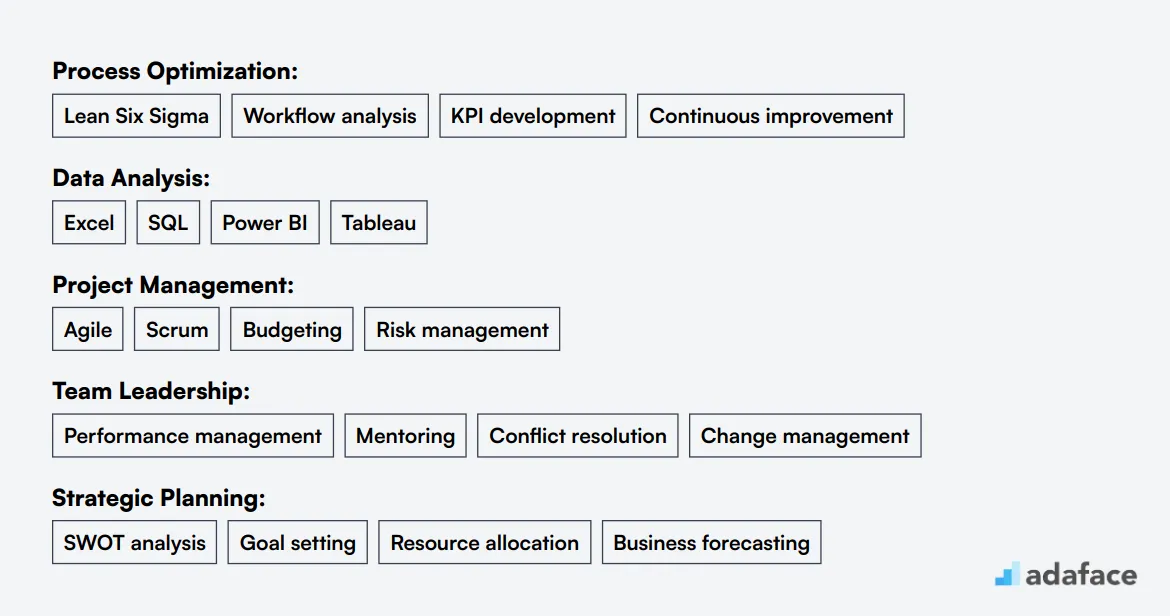
When manually screening resumes, focus on key terms related to process improvement, data analysis, and leadership. Look for specific skills like Lean Six Sigma, ERP systems experience, and project management certifications. This approach helps you shortlist candidates who align with your job requirements.
Another option is to use AI-powered tools for resume screening. These tools can quickly analyze large volumes of resumes and highlight candidates who best match your criteria. You can use AI chatbots or pre-employment assessment platforms to streamline this process.
Here's a sample prompt for AI-assisted resume screening:
TASK: Screen resumes for Business Operations Manager role
INPUT: Resumes
OUTPUT: For each resume, provide:
- Email id
- Name
- Matching keywords
- Score (out of 10 based on keywords matched)
- Recommendation
- Shortlist (Yes, No, or Maybe)
KEYWORDS:
- Process optimization (Lean Six Sigma, workflow analysis)
- Data analysis (Excel, SQL, Power BI)
- Project management (Agile, budgeting, risk management)
- Leadership (performance management, change management)
- Strategic planning (SWOT analysis, business forecasting)
- Industry-specific experience
- MBA or relevant advanced degree
Recommended skills tests for Business Operations Managers
Skills tests are an effective way to evaluate Business Operations Manager candidates beyond their resumes. They provide objective insights into a candidate's abilities and readiness for the role. Here are five key tests we recommend for assessing Business Operations Manager candidates:
Project Management Test: This test evaluates a candidate's ability to plan, execute, and oversee complex business operations. It assesses skills in resource allocation, timeline management, and project coordination.
Business Analyst Test: Use this assessment to gauge a candidate's proficiency in analyzing business processes, identifying improvement areas, and translating business needs into actionable plans.
Excel Test: An Excel skills assessment is valuable for evaluating a candidate's ability to manage and analyze data, create reports, and use spreadsheets for business operations tasks.
Problem Solving Test: This test helps assess a candidate's ability to tackle complex business challenges, think critically, and develop innovative solutions.
Leadership Psychometric Test: Use a leadership assessment to evaluate a candidate's management style, decision-making skills, and ability to lead teams effectively in a business operations context.
Case Study Assignments to Evaluate Business Operations Manager Candidates
Case study assignments can be effective in assessing Business Operations Manager candidates, but they come with drawbacks. These include lengthy completion times, lower candidate participation rates, and the risk of losing qualified applicants. Despite these challenges, well-designed case studies can provide valuable insights into a candidate's problem-solving abilities and operational mindset.
Operational Efficiency Improvement: This case study presents candidates with a fictional company facing operational bottlenecks. Candidates are asked to analyze the current processes, identify inefficiencies, and propose solutions to streamline operations. This assignment tests their ability to optimize business processes and improve overall efficiency.
Supply Chain Optimization: Candidates are given a scenario involving supply chain disruptions and asked to develop strategies to mitigate risks and improve resilience. This case study evaluates their understanding of supply chain management and their capacity to handle complex logistical challenges.
Cost Reduction Initiative: In this assignment, candidates are tasked with identifying areas for cost reduction within a company's operations. They must analyze financial data, propose cost-cutting measures, and outline an implementation plan. This case study assesses their financial acumen and ability to balance operational needs with budgetary constraints.
How to structure interview stage for hiring Business Operations Managers?
After candidates have passed the skills tests, the next step involves a technical interview to evaluate their hard skills. Skills tests are excellent at filtering out unsuitable candidates, but they don't always identify the best fit for the role. This interview stage allows for a closer examination of a candidate's ability to handle the tasks that a Business Operations Manager will encounter. Below are some sample interview questions tailored for this role.
- How do you prioritize tasks within a project? This question helps gauge their organizational skills and ability to manage multiple responsibilities.
- Describe a time you identified a process inefficiency. What did you do to address it? A good response indicates analytical skills and proactivity in improving operations.
- How do you ensure effective communication across different departments? This assesses their ability to collaborate and facilitate teamwork.
- What metrics do you use to assess business performance? This question evaluates their understanding of key performance indicators and data analysis.
- Can you give an example of a challenging decision you made recently? This provides insight into their decision-making process and problem-solving abilities. For more on what makes a strong candidate, explore the skills required for a Business Operations Manager.
How much does it cost to hire a Business Operations Manager?
The cost of hiring a Business Operations Manager can vary widely based on several factors. In the United States, the salary range for this role typically falls between $46,923 and $141,214, with a median of $81,402.
Location plays a significant role in determining the salary, with major tech hubs like San Francisco offering higher compensation. Other factors influencing the cost include the candidate's experience, company size, and industry sector.
Business Operations Manager Salary in the United States
The average salary for a Business Operations Manager in the United States ranges from $46,923 to $141,214, with a median of $81,402. Location plays a significant role in salary variations, with San Francisco, CA offering the highest median at $138,261, while San Diego, CA has the lowest at $52,047.
Factors influencing salary include experience, company size, and industry. Top-paying cities for this role are San Francisco, Seattle, and San Jose, reflecting the higher cost of living and competitive tech markets in these areas.
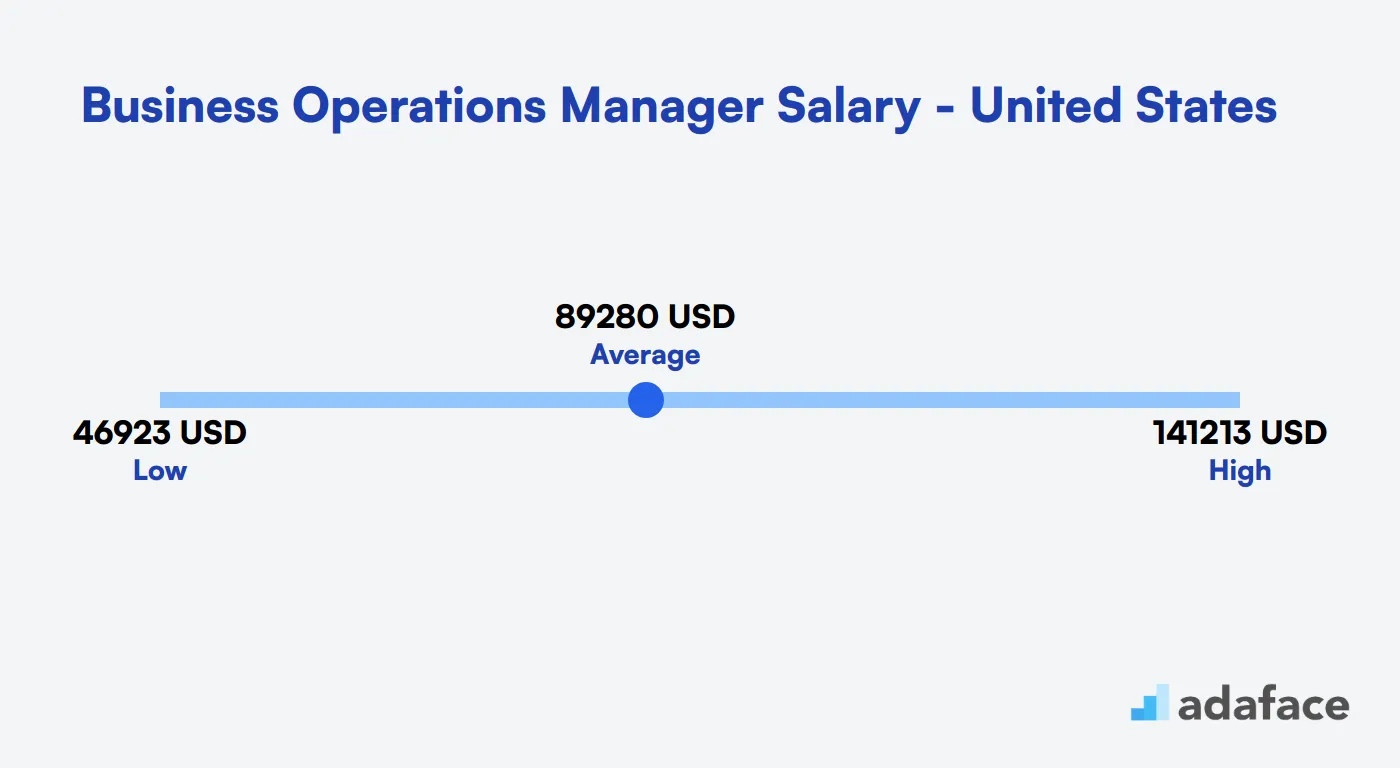
Business Operations Manager Salary United Kingdom
In the United Kingdom, the average salary for a Business Operations Manager typically ranges from £40,000 to £70,000 per annum. The lower end of the salary spectrum often starts at around £30,000, while those with extensive experience or in high-demand sectors can earn upwards of £90,000. These figures can vary based on factors like industry, location, and company size.
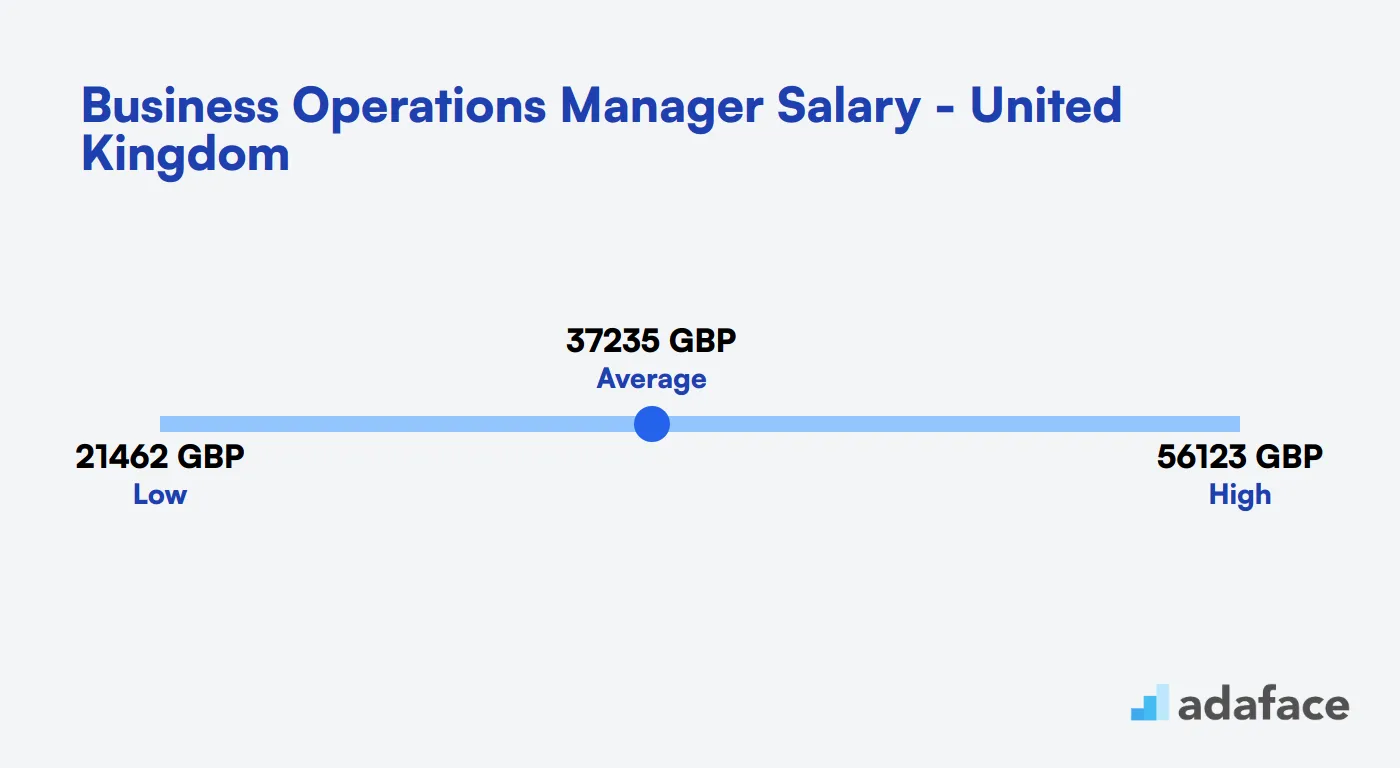
Business Operations Manager Salary in Canada
The average salary for a Business Operations Manager in Canada ranges from $50,493 to $111,011 CAD, with a median salary of approximately $74,868 CAD. In major cities such as Toronto and Calgary, the salaries can vary significantly, with Toronto averaging around $75,680 CAD and Calgary reaching up to $88,187 CAD. This variation reflects differences in cost of living and demand for talent across different provinces.
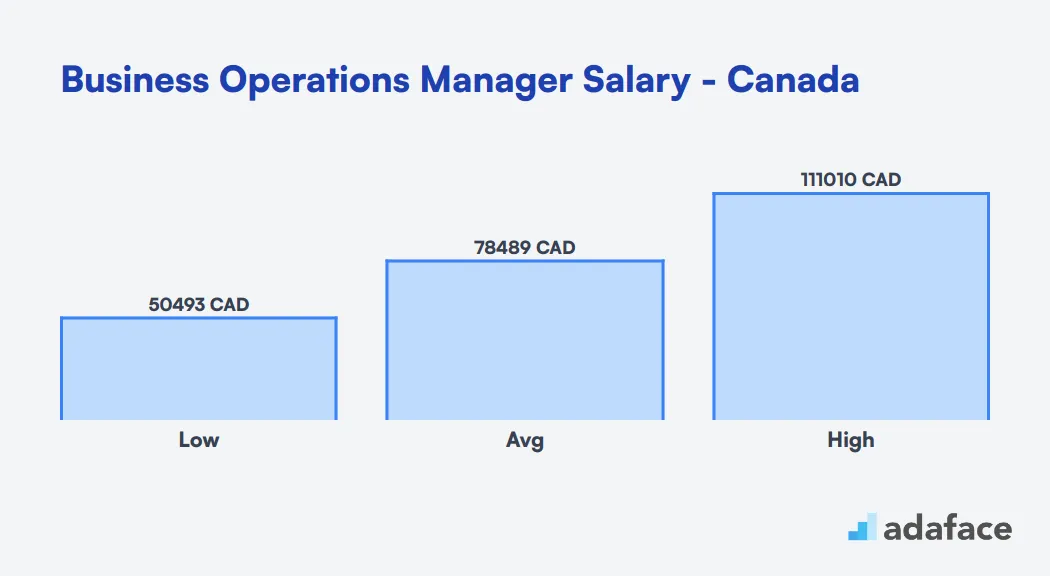
What's the difference between a Business Operations Manager and an Operations Project Manager?
At first glance, a Business Operations Manager and an Operations Project Manager might seem similar, but they play distinct roles within an organization. Both positions are integral to the smooth functioning of operations, yet their focus and responsibilities differ significantly.
A Business Operations Manager is concerned with the overall strategic operations. Their responsibilities include optimizing processes and overseeing daily operations. They typically come from backgrounds in business administration or operations and report to senior management like the COO. Their focus is on long-term strategic decision-making, using tools like ERP systems and CRM software to enhance operational efficiency.
On the other hand, an Operations Project Manager is more focused on project execution. Their main tasks involve planning and implementing specific projects, often with short-term tactical decisions. They usually have a background in project management or engineering and report to a project director. Key skills include project management and scheduling, employing project management software to meet project timelines and budgets.
Understanding these differences can help recruiters match the right candidate to the specific needs of the role. For additional insights on skills needed for a Business Operations Manager, visit our blog post.
| Business Operations Manager | Operations Project Manager | |
|---|---|---|
| Main Focus | Strategic Operations | Project Execution |
| Responsibilities | Optimize Processes, Oversee Operations | Plan and Implement Projects |
| Key Skills | Process Management, Leadership | Project Management, Scheduling |
| Typical Background | Business Administration, Operations | Project Management, Engineering |
| Decision Making | Long-term Strategic | Short-term Tactical |
| Reporting To | COO, Senior Management | Project Director, Senior Project Manager |
| Tools Used | ERP Systems, CRM Software | Project Management Software |
| Performance Metrics | Operational Efficiency | Project Timelines, Budget |
What are the ranks of Business Operations Managers?
Business operations managers play a key role in maintaining and improving the efficiency of a company, which sometimes leads to confusion with other roles like project managers or operations specialists. Understanding the different ranks within this role can help clarify their responsibilities and career paths.
Junior Business Operations Manager: Often an entry-level position, a junior business operations manager assists in the daily management and coordination of business operations. They focus on implementing processes and ensuring smooth operations under the guidance of senior managers.
Business Operations Manager: This mid-level role involves overseeing various operational aspects of a business. They manage teams, develop strategies, and collaborate across departments to improve organizational efficiency. For a detailed job description, you can refer to the Business Operations Manager job description.
Senior Business Operations Manager: A senior business operations manager is responsible for more complex operations and often reports directly to top-level executives. They handle large-scale projects and initiatives, aiming to drive significant improvements across the organization.
Director of Business Operations: This is a higher managerial role where the individual oversees all operations across the company. They develop long-term operational strategies and are integral to decision-making processes, focusing on aligning operations with business goals.
Hire the Best Business Operations Managers
We've covered the key responsibilities, skills, and qualities to look for in a Business Operations Manager. From understanding their role to exploring platforms for hiring, we've provided a comprehensive guide to help you make informed decisions.
The most important takeaway is to use well-crafted job descriptions and relevant skills assessments to ensure accurate hiring. Consider using a business analyst test to evaluate candidates' analytical and problem-solving abilities. Remember, finding the right fit is about balancing technical skills with cultural alignment and leadership potential.
Business Analyst Aptitude Online Test
FAQs
A Business Operations Manager should have strong analytical skills, leadership capabilities, excellent communication, and a strategic mindset to drive operational efficiency and support business objectives.
Use skill assessments, case study assignments, and structured interviews to evaluate candidates. Platforms like Adaface provide relevant tests to assess various competencies.
Candidates can be sourced from platforms like LinkedIn, job boards, recruitment agencies, and industry-specific forums. Check out our article on top platforms to hire Business Operations Managers.
They are responsible for overseeing daily operations, ensuring efficient business processes, and aligning operational activities with strategic goals.
While both roles focus on operations, a Business Operations Manager has a broader scope, overseeing entire business processes. An Operations Project Manager, on the other hand, focuses specifically on managing projects within operations.
Include responsibilities such as managing operations, developing strategies to improve processes, and collaborating with other departments, as well as desired qualifications and experience.
Interviews should be structured to assess both technical skills and cultural fit. Include situational questions, leadership assessments, and discussions on past experiences relevant to the role.

40 min skill tests.
No trick questions.
Accurate shortlisting.
We make it easy for you to find the best candidates in your pipeline with a 40 min skills test.
Try for freeRelated posts
Free resources



